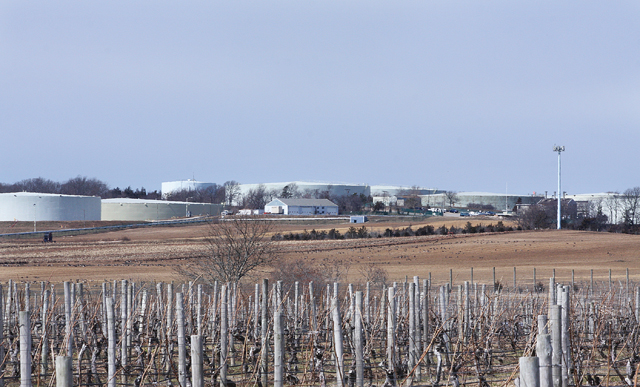Planned terminal expansion has neighbors on edge in Northville

Reached this week, Riverhead Town Board members were noncommittal about how they would vote on the special permit, which is necessary because the terminal is considered a pre-existing, non-conforming use under current town zoning.
Mr. Walter said one of the larger issues for him is traffic and how the company expects to get gasoline tankers in and out of the property and across town.
“They are moving a lot of product with 20-wheel trucks up Twomey Avenue and Sound Avenue and I am not really with that,” he said, adding that the town would like to see the trucks stay on Route 58, take County Road 105 to Sound Avenue and approach the facility from Pennys Road, to the west of the tank farm.
He also said the government officials Mr. Kamm referenced as having contacted the company after Sandy included mostly himself and local officials asking if the terminal could take gasoline, which it could not.
“When they came here the last time, they were not prepared,” Councilman George Gabrielsen said of URT’s presentation at the Oct. 21 hearing. “They’ve got to come up with something more professional. They have a lot of proving to do with me, particularly on traffic. They had trucks going up West Lane in Aquebogue. How bizarre is that?”
Mr. Gabrielsen, who operates a farm on Main Road in Jamesport, said large trucks would never be able to navigate the Main Road and West Lane intersection.
Neil Krupnick, president of the Northville Beach Civic Association, which has led the charge against the terminal expansion, said last week that residents have already seen “giant oil trucks” coming and going between the Northville terminal to Metro Fuels’ EPCAL property, using back roads.
“They have giant trucks using Edwards Avenue or Twomey Avenue and then taking Sound Avenue,” he said. “We followed them. We’ve seen them go straight to EPCAL and we’ve seen them on the Long Island Expressway.
“But definitely, the number of trucks from [the Northville site] this winter has been huge and the fact that they are big trucks is disturbing,” Mr. Krupnick said.
Councilman John Dunleavy said he has been behind three large trucks from the terminal on Sound Avenue near Roanoke Avenue, adding that he had not seen trucks there in the past.
“They are coming to and from Metro at EPCAL,” Mr. Dunleavy said.
Despite those claims, Vic Prusinowski, a former Town Board member now serving as a representative for URT, said the company has not increased its truck traffic or expanded its operation.
He also said the company was preparing a formal response to concerns raised by residents over the last six months or so, which would be presented to the Town Board at Wednesdays’ public hearing, which occurred after presstime.
The board will hold that hearing open for written comment for 30 days.
“I’m curious to see how they can mitigate the concerns of the residents,” Councilman Jim Wooten said earlier this week. “They have some real concerns, not only with the volatility up there, which they have to address, but also the whole traffic pattern. Right now, I’m on the fence.”
Mr. Wooten said residents’ concerns will weigh heavily in his decision on the special permit.
“I have only encountered two to three people who have said, ‘What’s the big deal?’ ” said Mr. Krupnick. That’s out of hundreds of emails, petitions, public hearings and comments on news reports, he added.
Bill Toedter, president of the North Fork Environmental Council, which has come out against the plan, said another chief concern is safety, because gasoline is more flammable than fuel oil.
“If someone gets careless with a cigarette, it’s a huge fire hazard,” he said.
Mr. Krupnik also pointed out that the property on which the terminal sits is zoned for residential uses.
“The whole point of the master plan was to ultimately get rid of non-conforming uses as much as possible,” he said. “That’s why EPCAL exists, for industrial uses.”
For Ms. McGraw, the direction of local legislation couldn’t be any clearer.
“This expansion will adversely affect ‘the health, safety, welfare, comfort, convenience and order of the town,’ ” she said, citing the standards of the law. “There should be no expansion of its nonconforming use.”
with Michael White








